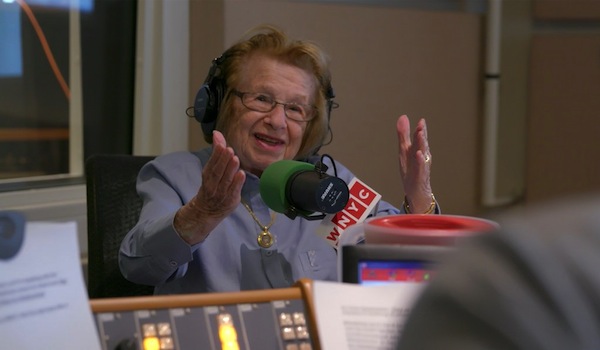Celebrity sex therapist Dr. Ruth Westheimer started life as Karola Ruth Siegel in Weisenfeld, Germany. (photo from Mongrel Media)
Before she rocketed to 1980s TV fame as sex advisor Dr. Ruth, she was simply Ruth Westheimer. And long before she was Ruth Westheimer, she was Karola Ruth Siegel of Weisenfeld, Germany.
It is those formative early years that provide the most resonant and affecting passages in Ryan White’s solid documentary Ask Dr. Ruth, which is scheduled to open in Vancouver May 10. I’ll go even further: They provide the film with its raison d’etre.
Sure, lots of people were helped in ways big and small by Dr. Ruth’s high-profile acceptance of (almost) every form of sexual behaviour and by her uninhibited, direct language about intimate acts and love relationships. But what lifts Ask Dr. Ruth above a “where are they now” profile of an old-media, pop-culture celebrity is Karola Ruth Siegel’s experiences before, during and immediately after the Second World War.
Most audiences, especially non-Jewish viewers, will come to Ask Dr. Ruth for the sex. The mitzvah of the film, as it were, is that they will get the Holocaust.
To be clear, Dr. Ruth doesn’t see herself as a Holocaust survivor. She is “an orphan of the Holocaust,” which is the most poignant and wrenching phrase you’ll encounter all week.
Born in 1928, Karola Ruth was the sole child of observant Jewish parents. She was too young to fully understand when the Nazis sent her father to a labour camp in the 1930s. And, as bright as she was, she couldn’t fully grasp the long-term implications when her parents put her on a train to Switzerland with a group of Jewish children.
Placed in an orphanage, Karola Ruth and the other Jewish kids were handed housekeeping duties and some responsibilities for caring for the Swiss kids. They received food and shelter, but zero love and little compassion. A natural ringleader – on the train, she’d organized a sing-along to distract the homesick youngsters – Karola Ruth figured out ways to educate and entertain herself.
She discovered boys, of course, and the film accompanies her abroad to a warm reunion with her first boyfriend, Walter Nothmann. It’s pretty chaste stuff, presented by Westheimer with nostalgia and charm, which conveys universal attitudes of adolescence.
At the same time, though, Karola Ruth was devouring and savouring every letter and poem she received from her mother and father – until weeks, and then months, passed without any communication. (She preserved and protected these treasures throughout her travels, and keeps them in plastic sleeves in a notebook.)
The animation style used by filmmaker White to illustrate Karola Ruth’s Swiss period is annoyingly juvenile, unless one presumes that children are one of the intended audiences of Ask Dr. Ruth. Admittedly, those experiences are as accessible and relevant to today’s children as Anne Frank’s, if not more so, but parents and guardians would need to know that the focus of a documentary about a sex therapist isn’t, uh, sex.
At some point after the war, Westheimer accepted that her parents had been killed by the Nazis, but she never sought out the details. All these years later, while visiting Israel during the filming of Ask Dr. Ruth, she goes to Yad Vashem and learns that her father died in 1942 in Auschwitz. The notation for her mother is “disappeared/murdered.”
Ask Dr. Ruth skilfully weaves three threads and three distinct time frames: its subject’s biography from the 1930s to the 1960s, her high-profile heyday in the 1980s and 1990s, and her peripatetic schedule of speaking engagements and family contacts, climaxing with her 90th birthday last June.
The trek to Israel, fascinatingly, includes a visit with a friend from Kibbutz Ramat David, where Ruth Siegel – persuaded that Karola was too German, she dropped it – landed in Palestine at age 17. This remarkable chapter of her life includes ceding her virginity, being trained as a Haganah sniper and, on her 20th birthday during the War of Independence, being injured so badly in a bombing that there was a question whether she’d be able to use her feet again.
The next 70 years of Dr. Ruth Westheimer’s life, spanning Paris, New York, three husbands, two children, a doctorate at age 42, a radio show, household name recognition and four grandchildren, are acutely interesting. But the imprint of coming of age during the war, without her parents but with determination, resourcefulness, intelligence and humour, defined Karola Ruth Siegel and infuses Ask Dr. Ruth with timeless importance.
“From my background, all of the things I’ve survived,” Westheimer declares, “I have an obligation to live large and make a dent in this world.”
Michael Fox is a writer and film critic living in San Francisco.

